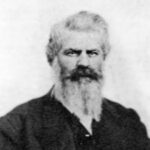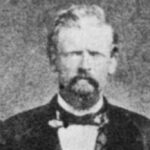 Politics can be a touchy subject. Many arguments have come from political disagreements, and in fact, a number of actual fights and even wars have been fought over political disagreements. The Civil War was one sch war fought over political views. During that time there were also a number of private disputes as well. Sumner Pinkham was in volved on one of those disputes. Sumner Pinkham was born in 1820 in the state of Maine and was raised in Wisconsin. Very little, if anything, is known about his early life. He married Laurinda Maria Atwood in Nebraska on November 4, 1842. In 1849, Pinkham joined the California gold rush and then spent time in Oregon before making his way to the booming gold rush camp of Idaho City in 1862. Pinkham was a big man…powerfully built, who stood six feet two inches tall and had a barrel chest. He was also prematurely gray, making him look older than he really was.
Politics can be a touchy subject. Many arguments have come from political disagreements, and in fact, a number of actual fights and even wars have been fought over political disagreements. The Civil War was one sch war fought over political views. During that time there were also a number of private disputes as well. Sumner Pinkham was in volved on one of those disputes. Sumner Pinkham was born in 1820 in the state of Maine and was raised in Wisconsin. Very little, if anything, is known about his early life. He married Laurinda Maria Atwood in Nebraska on November 4, 1842. In 1849, Pinkham joined the California gold rush and then spent time in Oregon before making his way to the booming gold rush camp of Idaho City in 1862. Pinkham was a big man…powerfully built, who stood six feet two inches tall and had a barrel chest. He was also prematurely gray, making him look older than he really was.
Pinkham was a conservative Republican, a Unionist, and an abolitionist, which put him on the opposite side of the majority of Boise Basin mining camps political views, which were predominantly Democrat. When Pinkham arrived in the Idaho City area, Idaho was still a part of Washington Territory, and the Boise Basin was located in Idaho County, of which Florence was the county seat. Florence was located a way away from the new mining basin, so the Washington Legislature established Boise County on January 29, 1863.
After being in the area for a while, and becoming known for his political views, the Governor of Washington was assigning commissioners and officers to the newly established county, and Pinkham was one of them, assigned to serve as the County Sheriff. On March 4, 1863, Congress created Idaho Territory. At that time Boise County exceeded the other counties in both area and in population. Those in office in Boise County at the time, including Pinkham, retained their positions until the territorial government could be officially organized. Pinkham appointed Orlando “Rube” Robbins, who shared his political opinions, as his deputy in August 1863. Robbins would later make himself known as one of Idaho’s greatest lawmen.
By this time, the Civil War was raging back East, and the area miners began to choose sides, around the Union and Confederate causes. This, dueled with whiskey, caused flair-ups between North and South sympathizers, bring with it fist fights, knife fights, and sometimes gun battles as they used force to show their opinions. That kept both Pinkham and his deputy, Rube Robbins, busy breaking up fights and locking up drunken loudmouths as they threatened to fight it out…to the death. The area being predominately Democrat often placed Pinkham at odds with his constituents due to his staunch Unionist views, Republican politics, and tough law enforcement. His list of enemies grew. Nevertheless, both Pinkham’s enemies and his most loyal friends knew that he was a man they shouldn’t mess with when he undertook to enforce the law, which he did with an iron hand.
His greatest enemy was a Southern gunfighter named Ferdinand “Ferd” Patterson. On one occasion, while Patterson was partying with some of his friends in Idaho City, they took unlawful possession of a brewery in Idaho City. Sheriff Pinkham was called by the owner to remove the rowdy group. When Pinkham entered the brewery, he was met with violent resistance. Pinkham and Patterson immediately hated each other. Patterson was Southerner who was crooked by nature, and Pinkham was a Northerner who tended to be self-righteous. In the end, Pinkham was successful, and Patterson was arrested. When Pinkham lost his October 1864 for re-election as Boise County Sheriff, in a bitter contest between the Democratic successionists and Republican candidates. Pinkham was defeated by A O Bowen by a comfortable majority, and Patterson celebrated, as the last of the ballots were being counted. When Patterson encountered his old nemesis, he began rubbing it in. Pinkham, who was in a rage, swung at Patterson, hitting him in the jaw and throwing the gambler off the street and into the gutter. After that, Pinkham walked away. Everyone expected Patterson to retaliate, but he let it go…for then. Pinkham left Idaho City, following the lost election, heading to Illinois to visit his dying mother. When he returned in 1865, everyone figured they would have it out, but it didn’t happen then either.
After the Civil War ended, Pinkham held a huge Fourth of July party. The crowds were mostly festive, with fireworks blazing and booze abundant. The celebration included a brass band, speeches, patriotic songs, a picnic, and a parade with Pinkham leading the way through town. For the victorious Yankees, it was a proud day. But, for the sullen Confederate sympathizers…not so much. To make matters worse, the Yankee’s heckled the “Blue Bellies” throughout the day. Patterson was furious as he watched Pinkham leading the parade through town. Pinkham singing, “Oh, we’ll hang Jeff Davis to a sour apple tree!” was the last straw. Patterson yelled out to the ex-sheriff that if “he didn’t shut his mouth, he’d shut it for him.” Pinkham invited him to try, and he did. A brief fist fight between the two men resulted in the flag falling into the dust of the street. Some witnesses swore they saw Patterson spit on it, and others attested they heard Pinkham swear he would kill Patterson for that, but nothing more came of it at that time. Several weeks later, on Sunday, July 23rd, Pinkham took a hired carriage from Idaho City to the Warm Springs Resort, which was about two miles west of town. Upon his arrival, Pinkham joined a number of his Unionist friends in the saloon, where they were heard singing patriotic and anti-Confederate songs.
Sometime later, Patterson entered the resort while Pinkham was paying his bill. Initially, Patterson ignored Pinkham, but by the time the ex-sheriff exited the resort, Patterson was outside waiting for him. Patterson said the word “draw” and then taunted Pinkham by calling him an “Abolitionist son-of-a-b***h.” Who drew first is in dispute, but in the end, Pinkham was dead. Patterson quickly fled but was immediately followed by several lawmen. Rube Robbins was the first to catch up to him, about 14 miles from Idaho City. Patterson surrendered to Robbins, who turned the killer over to Sheriff Bowen, who was next on the scene. Bowen and his men took over and escorted Patterson back to Idaho City.
A mob wanted to lynch him, and maybe that would have been justice, because in the “sham” trial held in a predominately Democrat area, Patterson was acquitted, and with that, justice for Pinkham would never be served. Ferd Patterson was tried for Pinkman’s murder at the beginning of November 1865. In the six-day trial, defense attorney Frank Ganahl claimed his client acted in self-defense, arguing that Pinkham was lying in wait  for him. Alternatively, Pinkham’s friends testified that he tried to avoid a showdown and that Patterson came to Warm Springs with the explicit purpose of murdering Pinkham. It took only an hour and a half for the jury to acquit Patterson. Pinkham’s funeral was the largest and most impressive funeral ever seen in the mining camp. It was reported that over 1,500 mourners followed his hearse to the graveyard. Meanwhile, knowing he was in extreme danger, Patterson quickly fled Idaho City after his acquittal. He was killed in Walla Walla, Washington, the next year, by Thomas Donahue, an area policeman, in was thought by many to be an assassination. Donahue was charged with the murder of Patterson, but escaped from jail while awaiting trial. There apparently was little interest in tracking him down. He disappeared never to be heard from again.
for him. Alternatively, Pinkham’s friends testified that he tried to avoid a showdown and that Patterson came to Warm Springs with the explicit purpose of murdering Pinkham. It took only an hour and a half for the jury to acquit Patterson. Pinkham’s funeral was the largest and most impressive funeral ever seen in the mining camp. It was reported that over 1,500 mourners followed his hearse to the graveyard. Meanwhile, knowing he was in extreme danger, Patterson quickly fled Idaho City after his acquittal. He was killed in Walla Walla, Washington, the next year, by Thomas Donahue, an area policeman, in was thought by many to be an assassination. Donahue was charged with the murder of Patterson, but escaped from jail while awaiting trial. There apparently was little interest in tracking him down. He disappeared never to be heard from again.


Leave a Reply